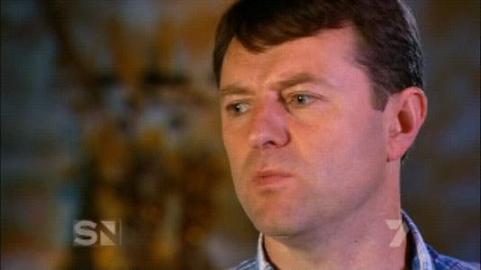|
They haven't got a clue down under - literally. The reporter fronting
the recent Seven on Sunday programme announces an exclusive interview
with Kate and Gerry McCann thus:
"Kate and Gerry McCann have lived a never-ending ordeal and they still
don't know when, or if, it will ever end. It began on a family holiday
in Portugal when Madeleine, their four-year-old daughter, simply
vanished. She hasn't been seen since. Tonight the mystery deepens. You
are about to see home video never shown before and learn the vital clue
Madeleine left behind."
Unfortunately for the expectant viewers, they never get to learn what
that vital clue is. Personally, I don't think it's Natasha Kampusch's
psychological recovery from trauma. There are however other clues which,
thankfully, did not drift onto the cutting room floor.
(Voice over): "On Thursday night, Kate put her daughter to bed for the
last time."
KM: "My memory of that evening is really vivid. I mean she was really
tired, but she was just cuddled up on my knee. We read a story,
mmm...had some treats, some milk and biscuits, errm... and then after
they'd done the usual 'toilet-teeth', errm... we went through to the
bedroom and read another story 'If You're Happy And You Know It', errm...
(long pause)...yep..." (silence).
And there it ends. No description whatsoever of actually putting the
children to bed, despite Kate's 'vivid recall' of that evening. The
account simply stops dead without a conclusion. This is a classic
example of an unbalanced story, and one that's easily viewed with
suspicion. Put very simply, if a story does not have a conclusion then
there isn't one.
Kate next tells us that when the curtains blew up, they revealed that
the shutter was 'all the way up' and the window had been 'pushed right
across.' One of several highlights from the Channel 4 documentary
(Madeleine Was Here) to be spliced into the proceedings, viewers are
treated anew to the episode of the door being 'open much further than
we'd left it.' Strange how Matthew Oldfield didn't notice the cold air
inside apartment 5A, the various doors and windows having been open for
twenty minutes by the time he is said to have peered into the children's
bedroom from the lounge. Even stranger that Kate didn't notice the drop
in temperature a further half-hour after that. (It was cold enough for
Jane Tanner to have borrowed a fleece before setting off up the magic
path of invisibility).
But the best is yet to come.
"Did you kill your daughter?" asks the lady journalist. Gerry answers:
"No. That's an emphatic 'no.' I mean the ludicrous thing is. Errm...
what... I suppose... what's been purported from Portugal is that
Madeleine died in the apartment by an accident and we hid her body.
Well, when did she have the accident and died? Cos... the only time she
was left unattended was when we were at dinner, so if she died then, how
could we have disposed of... hidden her body when there was an immediate
search. It's just nonsense. So. An' if she died when we were in the
apartment or fell injured, why would we... why would we cover that up?"
KM (interjecting): "And it gets even more ludicrous, that we've
obviously hidden her so incredibly well, where nobody's found her and we
hid her (interviewer: 'incredibly well') so well that we then decided
that we'd move her in the car which we hired weeks later and you know
it's just ridiculous."
Let's take this a step at a time.
"Did you kill your daughter?"
"No. That's an emphatic 'no.'"
This is Gerry speaking don't forget. For any other innocent mortal
'Absolutely not' would have been a sufficient response. Not for Gerry
though. Despite his subsequent claim, he gives a decidedly unemphatic
answer - 'No.' What follows is meta-language, where he is describing his
earlier articulation of a word and does not address the underlying
semantics in any way. Incoherent and unnecessary expansion then takes us
away from the original question, referencing what has been 'purported'
in Portugal, namely that 'Madeleine died in the apartment by an accident
and we hid her body.'
Next comes a cunning locking of the incident to a specific time frame,
with the suggestion that Madeleine could only have had an accident when
unattended. But Gerry slips up in questioning how it would have been
possible for them to have disposed of Madeleine's body. In immediately
substituting the phrase hidden her body he has already told us what in
fact happened. Excitedly he goes on to ask why the parents should have
covered up an accident. Why indeed.
It hardly comes as a surprise that Kate leaps in at this point, before
Gerry's mouth can write any more bad cheques. She loses no time in
elaborating upon the 'hide-and-seek' scenario played out that Thursday
night, and the 'ludicrous' idea of their hire car being involved
afterwards. But the damage has already been done.
The script, charitably outlined by Goncalo Amaral and fleshed out here
by the McCanns, so as to exonerate themselves, depends entirely for its
effect upon the premise that little Madeleine disappeared inexplicably
that Thursday night; a premise that becomes less clear the closer it is
examined. And Gerry is right. It wouldn't make sense to conceal an
accident. |


